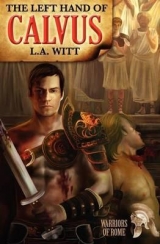
Текст книги "The Left Hand of Calvus"
Автор книги: L. A. Witt
Жанры:
Историческая проза
,сообщить о нарушении
Текущая страница: 10 (всего у книги 10 страниц)
“Kaeso?” I whisper.
He jumps. Then nods.
I beckon for him to come closer.
Maharbaal grabs Kaeso’s shoulder. “Not yet. Where’s my money?”
“Where’s my guarantee you won’t harm the boy once you have the money?”
Kaeso’s eyes widen. The slaver doesn’t release him.
“Prove you have the money,” he growls.
“It’s all right here.” I pull out the coin purse and hold it up. “Let the boy go.”
“Akbar.” Maharbaal gestures sharply at me. “Take the money.”
Akbar reaches for it, but I pull it away.
“Let’s be clear,” I say. “The boy is so much as scratched, and I will see to it every throat in this camp is open before dawn.”
“I’m a businessman,” Maharbaal says. “Not a thief. Give him the money.”
Without taking my eyes off Maharbaal, I hand the coin purse to Akbar. As soon as my hand is relieved of the weight of the coins, my heart beats faster.
“Now let him go,” I demand.
Maharbaal doesn’t. He looks at Akbar, who opens the coin purse and riffles through it.
Finally, Akbar nods. “It’s here. All of it.”
Maharbaal shoves Kaeso toward me. “Get out of here. Both of you.”
I squat down to Kaeso’s level and put a hand on his shoulder. My gods, if ever I’d had reason to doubt Kaeso’s parentage, those doubts are gone now. The blue eyes, the features that time has already begun to sharpen; this is unmistakably the son of Drusus.
“Are you all right?” I ask. “Have they harmed you?”
He doesn’t speak, just shakes his head vigorously.
“Thank the gods,” I whisper, and beckon to him. “Come on. Let me get you out of here.”
Kaeso balks. “Are you taking me back to Grandfather? I don’t want to go—”
“I won’t. I promise.”
I take Kaeso by the hand and lead him out of the tent and into the heavy heat of the night.
“Where are we going?” Kaeso asks as we head toward the edge of the camp.
“Somewhere safe.” I glance around and listen for anyone who might try to stop us on our way out.
Kaeso doesn’t question me further. He just holds my hand a little tighter.
A flickering glow comes into view, and I walk faster. From the other side of the tiny campfire, Drusus stands, his eyes wide in the low light, and I can tell from here he’s holding his breath.
Kaeso stops. Then gasps. “Drusus?”
“Kaeso.” Drusus releases a breath. “Oh, thank the gods.”
The boy runs toward him, and Drusus opens his arms for his son. Kaeso throws his arms around Drusus, who winces painfully and sucks in a breath, but he doesn’t push the boy away. For a moment, he doesn’t move at all, just closes his eyes and holds Kaeso tightly against him.
Then he releases him and draws back, looking him up and down. “Are you all right? Did they hurt you?”
“They didn’t hurt me.” Kaeso’s expression falls, and his eyes well up. “But Nan is dead.”
Drusus smooths the boy’s hair. “I know she is.”
I touch Drusus’s shoulder. “We need to get away from Pompeii. The whole city’s going to be looking for us at sunrise.”
“Right.” Drusus stands and takes his son’s hand. “We’d better get moving.”

We creep through the darkness and far away from the city. On exhausted legs—and I can only imagine the pain Drusus is in, but he refuses to stop even when every step has him cursing and gritting his teeth—we follow one of the winding roads that leads past the farmlands and into the hills outside Pompeii.
It’s nearly dawn when we finally stop to rest. Far off the road, hidden in a cave, the three of us collapse.
I awaken first, sitting up gingerly. My body, especially the tender flesh that’s trying to heal across my scourged back, protests every motion. The sun has barely risen, and my bones ache with fatigue, but we can’t risk staying here long.
Beside me, Drusus has his uninjured arm around Kaeso, the boy’s small frame huddled close with his head under Drusus’s chin.
Drusus’s eyes flutter, and he shifts a little, wincing and sucking in a breath.
“You all right?” I ask.
He nods. “Nothing that won’t heal. I’ve had worse.” He grins wryly. “I’m sure you have too.”
Chuckling, I nod. “Probably, yes.”
He looks down at his son, and tenderly runs his fingers through the sleeping boy’s hair. “Thank you, Saevius,” he whispers. He lifts his gaze. “I’ll be indebted to you as long as I live.”
I smile. “You gave me my freedom. I can’t ask for much more than that.”
He returns the smile, but says nothing.
After a while, I break the silence. “I’m curious about something.”
Drusus raises his eyebrows. “Hmm?”
“When I first arrived at the ludus, you confronted all the auctorati about a message someone tried to send out.”
A strange, mischievous grin slowly comes to life on his tired face. “Yes?”
“What did it say?”
Drusus laughs softly, watching himself stroke his sleeping son’s hair. “It didn’t say anything.”
“What?” I cock my head. “What do you mean?”
He looks at me through his dark lashes. “I was bluffing.”
My mouth falls open.
Drusus laughs again. He shifts a little, wincing as he tries to get comfortable without disturbing Kaeso. Once he’s situated, he says, “I knew there was treachery within the familia. I didn’t know who, didn’t know exactly what, but any lanista who wants to live another day knows damn well when his men aren’t as loyal as they say they are.”
“How did you know it was an auctoratus?”
“I didn’t.” He lets his head rest against the cave wall. “Not for certain, anyway. Something about them didn’t feel right, though. Nearly half a dozen auctorati joining my ludus within months of each other? Some of them even shiftier than the other men in the familia?” He slowly shakes his head. “Something wasn’t right.”
“So you bluffed,” I say. “With a false message.”
He nods. “Make them believe not only am I onto them, but there’s another among them. Make them skittish and hope they make a mistake.”
I laugh. “Well, it did worry at least one of them.”
Drusus arches his eyebrow, an echo of the lanista who’d intimidated me from the start. “And you were one of the men who’d joined under suspicious pretenses, yes?”
“I was.”
“Never cross a lanista, Saevius,” he says with a half-grin.
I laugh again. “I’ll remember that.”
Beside Drusus, Kaeso stirs. A moment later, he raises his head, blinking sleepily. “Where are we?”
“The gods only know,” Drusus says. “But we should get moving.” He winces as he tries to get up. I stand, extend my hand, and he takes it, letting me ease him onto his feet.
“Where are we going?” Kaeso asks, rubbing his eyes with his fists.
Drusus tousles the boy’s hair. “We’ll know when we get there.”
“Wherever we go,” I say, “we’re no one. I’m not a citizen, and you’ll be arrested the moment anyone figures out who you are. Could be difficult to make a living, and I’d just as soon not set foot in another ludus.”
“I’ve had my fill of ludi, believe me,” he mutters. “But I’ve falsified a life before. I can do it again.” Then he smiles. “I hear Rome is lovely.”
I wrinkle my nose. “I’d rather live in Pompeii’s sewer. What about Alexandria?”
“Unless you know where we can get both horses and a ship that will take us that far,” Drusus says, “Kaeso will be an old man before we get there.”
“What about Carthage?” Kaeso says.
“Isn’t that almost as far from here as Alexandria?” I ask.
“I think so.” Drusus looks at me, shrugging with one shoulder. “But the farther from here we go, the better. Alexandria, Carthage . . .” Another shrug. “Let’s just leave this damned city behind.”
“Agreed.”
Though we still don’t know where we’re going, where we’ll one day find ourselves, we get on the road and start toward the south.
As the road crests a hill, I pause and look back, stealing just a moment to take in the sight of Pompeii awakening in the shadow of Vesuvius. By now, the men in the familia know they’re free. If they’re wise, they’ve taken the money and documents Drusus left behind, and they’ve fled the ludus, if not Pompeii.
Word should already be getting around the city. The graffiti and the declaration Arabo nailed to the Forum door leave little to the imagination about Calvus’s actions against his wife and his grandson. Even if it’s not enough to punish him, it will leave a foul taste in the mouths of the populace, which is as lethal as hemlock to a politician.
“Saevius?”
I turn around.
Drusus cocks his head. “Something wrong?”
I glance at Pompeii one last time, then shake my head and continue after Drusus and the boy. “Nothing. Just a pity we couldn’t stay in Pompeii.” I put my hand on Drusus’s back as we walk. “All things considered, I was beginning to like the city.”
This time it’s Drusus who looks back. “If that’s the last time I lay eyes on that place,” he says, wrapping his arm around my waist, carefully avoiding my tender wounds as he faces forward again, “I’ll die a happy man.”
“Come on!” Kaeso calls from up ahead. “You’re too slow!” He trots down the dusty road.
Drusus blows out a breath and shakes his head. “We’re going to need horses just so we can keep up with him on foot.”
I chuckle. “You’re probably right.” We both laugh and continue following the cloud of dust behind Kaeso.
I steal one last glance behind. Pompeii is gone now, and only the peak of Vesuvius remains in sight.
Wherever we find ourselves, in whatever city the three of us eventually make our home, I have no doubt that I for one will die a happy man. A happy free man.
And the gods can have Pompeii.


Alexandria: A city in Egypt.
Auctoratus: A citizen or freedman who volunteers to be a gladiator (and slave) for a specific period, usually about two years. Typically done to pay off debts.
Bacchus: Roman equivalent of Dionysus, god of wine.
Familia gladiatori: Troupe of gladiators belonging to a specific ludus, owned by a lanista.
Fates: Three females from Roman mythology who control the destiny of mortals and gods alike.
Flagellum: Weapon similar to a modern-day cat-o’-nine-tails, used to punish slaves.
Fortune: Roman goddess of luck.
Gaul: Region of modern-day Western Europe conquered by the Romans. Includes modern-day France and Belgium.
Herculaneum: Small, wealthy town near Pompeii that was also destroyed by the eruption of Vesuvius in AD 79.
Lanista: Owner of the ludus and its gladiators.
Ludi: Public games held as part of specific religious festivals such as the Ludi Appollinares (honoring Apollo), the Ludi Augustales (honoring Augustus), the Ludi Florales (honoring Flora, goddess of plant life), and the Ludi Romani (honoring Jupiter). (Also: when lowercase, the plural form of ludus. See below.)
Ludus: (plural: ludi) A gladiator school.
Manica: Armguard made out of linen.
Medicus: Physician who treats wounded and ill gladiators.
Missum/Missus: Mercy granted by the munerator to a defeated fighter.
Munerator: Organizer of gladiatorial games. Also the one who gives or denies missus.
Myrmillo: Type of gladiator who fights with similar equipment as a Roman legionary. Typically paired with a thraex.
Noxii: Condemned criminals sentenced to die in the arena.
Parthian: Someone from the Parthian Empire, later called Persia.
Plebeians: Non-aristocratic citizens of Rome.
Pol: Expression of exasperation.
Pompeii: Roman city in the Campania region of Italy. Destroyed by the eruption of Vesuvius in AD 79.
Retiarius: Type of gladiator who fights with a net and trident.
Rudis: Symbolic wooden sword given to gladiators who have earned their freedom.
Sestertii: Roman coin.
Tartarus: Underworld.
Thraex: Type of gladiator who fights with a small, rectangular shield and a short, curved sword. Usually paired against a myrmillo.
Velarium: Awning pulled over the stands of the amphitheatre to shade spectators during the games.
Venus: Goddess of love; Roman equivalent to the Greek goddess Aphrodite.
Vesuvius: The volcano to the northwest of Pompeii that wiped out the city in AD 79.
Vigiles: Police and firefighters.








